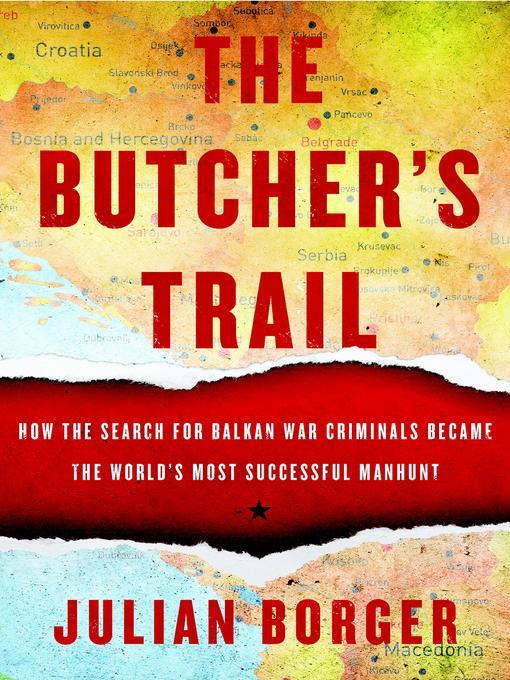
The Butcher's Trail
How the Search for Balkan War Criminals Became the World's Most Successful Manhunt
کتاب های مرتبط
- اطلاعات
- نقد و بررسی
- دیدگاه کاربران
نقد و بررسی

November 9, 2015
Guardian diplomatic editor Borger, who covered the Balkan War of the 1990s, vividly relates how the International Criminal Tribunal for the former Yugoslavia (ICTY) tracked down the 161 individuals on its most-wanted list. Many of them lived among sympathetic populations; U.N. peacekeepers initially avoided pursuing war criminals, and U.S. secretary of defense William Cohen also opposed hunting them down. By the time the 1995 Dayton Peace Accords were signed, an air of impunity surrounded the fugitives. The pursuit picked up after President Clinton’s 1996 re-election and the election of Tony Blair as U.K. prime minister, and it was furthered by the efforts of Louise Arbour and Carla Del Ponte, successive heads of the ICTY, who made Croatia and Serbia’s cooperation a condition for significant financial aid and admission into the E.U. Borger recounts the tracking and capture of the “big three”: former Serbian president Slobodan Miloševic´, Bosnian Serb politician Radovan Karadžic´, and Bosnian Serb military commander Ratko Mladic´. While noting that efforts to bring some of the perpetrators to justice have suffered setbacks, Borger’s well-researched account nevertheless makes the case that the ICTY’s hard work and persistence represented “the high-water mark of international justice for crimes against humanity.” Maps and photos. Agent: Sarah Chalfant, Wylie Agency.

Starred review from October 1, 2015
A bracing history of the hunt for Balkan war criminals and the seminal establishment of the Hague Tribunal in 1993. Diplomatic editor for the Guardian, English journalist Borger covered the conflicts in Bosnia and Kosovo during the 1990s for both the Guardian and the BBC. In his debut, he offers the thrilling account of the long-running international search for the masterminds of "ethnic cleaning" during these wars. With the disintegration of Yugoslavia in 1991 into rival states, ethnic bloodshed erupted, especially in Serbia, led by ruthless leader Slobodan Milo]evic, who eventually became the "first sitting head of state ever to be charged with war crimes in an international court." Though horrified by the bloodshed in Bosnia, the United States under new President Bill Clinton was loath to send in troops, leaving the United National Security Council to establish the International Criminal Tribunal for the former Yugoslavia, an experiment in justice with an eye to the postwar Nuremberg Trials. Yet the court had little authority to track down and prosecute criminals like Milo]evic, his puppet Goran Hadic, Croatian counterpart Franjo Tudjman, Bosnian Serb leader Radovan Karadic, and many others. In his vivid, page-turning account, Borger follows not only the actual hunt for the criminals, which took years and as many false starts as successes by a team of international special forces, but also the astonishing legal history that the ICTY forged in bucking a complacent international mindset. The author chronicles the tireless work of keen advocates of the ICTY, such as U.S. Secretary of State Madeleine Albright, and the intrepid "tracking team" led by chief prosecutors Louise Arbour and Carla Del Ponte. Borger impressively consolidates this important story, and he also includes a useful chronology of "arrests and transfers to the ICTY in the Hague." A well-organized, deeply researched work that ably digests the Balkan war, the criminals, the criminal court, and its legacy.
COPYRIGHT(2015) Kirkus Reviews, ALL RIGHTS RESERVED.

December 1, 2015
After covering the creation of the International Criminal Tribunal for the Former Yugoslavia (ICTY), Borger (diplomatic editor, The Guardian) delves into the frustrating manhunt to track down accused war criminals. Follow a recently formed Polish commando unit making the first arrest, Germany in military action for the first time since World War II, and a reluctant French Force, along with British and American special-op units, as they work with, and against, local police and intelligence units to track down the ICTY's most-wanted fugitives. The accounts and background decisions of each search and capture are presented in captivating detail often playing out like a true-life spy novel. However, the sheer number of people, territories, and international interests involved can be dizzying. Each individual's accused crimes are described, as are the implications these missions had on future renditions and extractions. In a cruel irony, captives end up housed in one of the most progressive jails in the world, a stark contrast to what the peoples of their respective nations suffered through under their leadership. VERDICT Those with a strong interest in the nations of the former Yugoslavia, covert military operations, and international law and relations will find this work most fascinating.--Zebulin Evelhoch, Central Washington Univ. Lib.
Copyright 2015 Library Journal, LLC Used with permission.

























دیدگاه کاربران